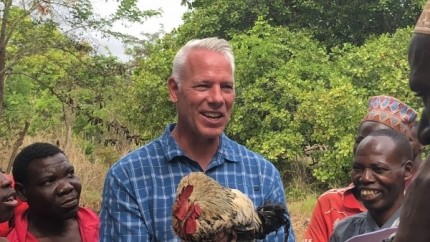
When Wayne and his family decided that they wanted to support some charities, they were looking for organizations that would provide the most value for their money. They ended up choosing Global Aid Network (GAiN) as one of the charities, specifically supporting the Water for Life Initiative project in Tanzania by providing a deep-capped water well to the Nakalonji village.
It was at a GAiN event where Wayne heard about the opportunity to go on a LIFE Team Vision Trip to Tanzania and see the well he gave. He ticked off a box on a response card, indicating that he was interested in learning more. Just a few months later, he was on a plane to Tanzania with a team of other GAiN donors and some GAiN staff.
VISITING THE WELL IN NAKALONJI
To get to the village of Nakalonji from where they were staying, the group had to make a two-and-a-half hour drive on dangerous roads, in what seemed to be the middle of nowhere. They followed the road all the way to the end, which stopped right at the village.
Before the provision of a water well, the people of Nakalonji had to walk and/or bike four kilometers away from the village to get any kind of water.
Wayne and the team were able to go there to get a glimpse into what life was like before the village received its well.
“They just dug into the dry river bed in the dry season and they just scoop the water out from there. It was pretty murky and gross looking,” Wayne remembered.
The dirty water that villagers were gathering left them sick. They reported getting cholera (a waterborne disease that can cause diarrhea and dehydration, and can even lead to death if untreated) as a result of drinking the contaminated water.
When the village received their water well, they no longer had to worry about walking too far and contracting illnesses from the water they consumed. So, when the village learned that Wayne would be in town, they took the opportunity to let him know how much his gift had impacted their lives.
“A lady [from the water committee] was there with all the village leaders and she had three pages that she read out about what the [water] well meant to them and how it had changed their lives,” Wayne recalled. “When she read those three pages of what the well meant, you just kind of stand there and go, ‘Whoa, this is crazy.’ It’s just a well, right? Here in Canada, what would that mean to us? Not that much, right? But in that remote area of Africa it means life. It saves their lives and increases productivity of the people and the ladies have more chance to go to school and all of those different things.”
Wayne was also presented with a gift from the villagers – a rooster that they decided to call “Little Wayne”, as a way to thank him. While he couldn’t take it back home with him to Canada, he knew that the locals would be offended if he refused it, so he accepted the rooster and took it back to the hotel.
“I gave it to the kitchen staff and they were very happy. My wife was worried I was going to bring it home whereas the kids wanted me to bring it home!” The words of affirmation and special gift from the villagers demonstrated the appreciativeness and gratitude of the people of Nakalonji.
“It was a bit humbling actually because I didn’t want to be put up on a stage and have everyone look at me and say, ‘Oh, there’s the guy.’ I would have rather just gone and seen the well and stayed in the background a bit. Ray (GAiN Executive Director and CEO) had to point me out to them. But [it ended up being good because] I actually got to speak to the locals. I told them, ‘I would think of you when I was at home in Canada. I could try to picture what it was like here. I could picture people coming up to the well and getting water and taking it back. But [it wasn’t] until I actually got here that I could now see who you are and I know who you are now.’”
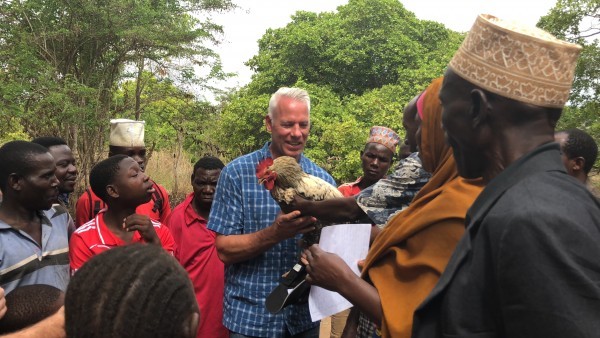
COMMUNITY
Wayne couldn’t help but notice the sense of community surrounding the wells. He was impressed by the way that communities worked together to help one another.
At a nearby village that also had a well, he noticed that stronger villagers would stick around to pump water for villagers who could not pump water for themselves.
And while visiting another village that was waiting for their new well to be completed, he witnessed local ladies preparing food for the well drillers so that they would not have to stop to cook on their own. “They were totally invested into the well. I thought that was cool. [The villagers] took ownership by all of the things they were doing there and that was really neat.”
After the village of Nakalonji received their well, the JESUS Film was shown in the village. In that village, 291 people came out and were exposed to the story of Jesus.
Community development trainings were also held in Nakalonji to round out the wholistic impact of the well. Ninety-nine locals learned about simple but life-changing hygiene practices, such as hand washing and waste disposal, through the local hygiene and sanitation training. In a gender sensitivity training, 109 men and women attended a facilitated discussion on gender roles and expectations, giving women a safe space and opportunity to have a voice. And finally, a water committee training was hosted for seven villagers who were elected by their village to manage and care for the well.
To help understand the full scope of what GAiN does in Tanzania, the team got a chance to see what an actual showing of the JESUS Film looked like in a remote village called Kitandi Shuleni.
“It was pitch black out. There were no streetlights, there was no street, no sidewalks. It’s just a village that is one-third rubble. People are sitting outside cooking on these open fires and [the local team] gave us a phrase to say to go out and invite people to come to the movie. So we walked out in little groups, walking down the dusty lanes. That really struck me how they were living with just about nothing.”
Five-hundred-thirty-nine people showed up and after the film was finished, eleven people made decisions to follow Jesus. Many people who attended asked for prayer from the team.
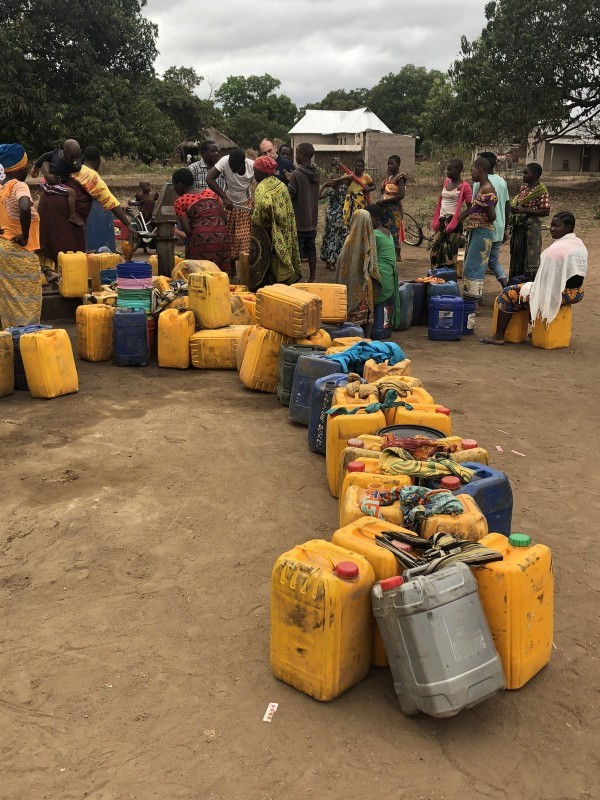
SCRATCHING THE SURFACE
Through his partnership and trip with GAiN, Wayne was able to not only see how God is transforming lives wholistically in Tanzania, but also build a relationship with the locals. He had the opportunity to see how his donation of a well made a lasting impact; revealing hope and restoring life to a remote village that was once just a vision in his mind.
“[My experience] was way better than I expected. I never imagined it would be like how it was. I didn’t think I’d fall in love with the people of Africa so much. It’s life-changing, actually, just to see the work that is being done there and how it affects their lives.”
When reflecting on what he had seen, Wayne said: “You look at the surface of the country and the buildings and the lack of things. We have so many things here. They don’t have any of that. But once you scratch the surface there’s so much joy there and happiness. And they had that spirituality that we don’t have; that ability to worship and pray. I thought, ‘Man, they have more than we do, actually.’ We have all of these [material] things but those things stop us from seeing God as clearly [as they do]. That’s what really surprised me — seeing the depth of their worship. That joy that is just below the surface.”
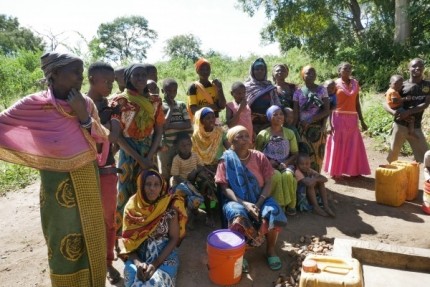
Women love to talk, that is a universally shared characteristic of women in community. It is certainly true of the women in the village of Chipunda in southern Tanzania. The well is a social place for this community. When women come with their children to collect water, they stay and talk with the others that have come. They talk about their families and their farms, their relationships and the hardships they are facing. They laugh and cry together. This is the mortar that holds the bricks of a community together, love and care for one another.
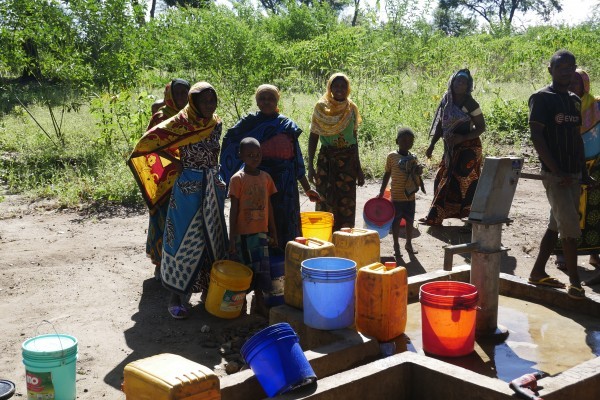
They still did all of this before the deep-capped well was provided for them by Global Aid Network. But instead of enjoying the social aspects of collecting water in a safe place that’s near to their home and from a well that provides clean water for them and their families, they were traipsing through the jungle in search of any water source, clean or dirty, and hauling it back to their homes, day and night. They were suffering from many water-borne diseases that they would often debilitate them, making it even hard to get water.
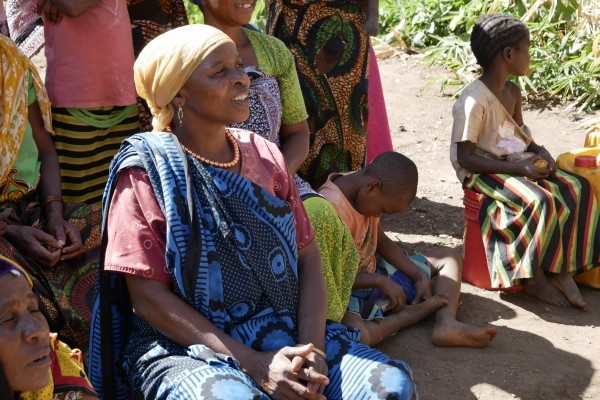
Now they get to enjoy time together at the well, free from the suffering that they lived in for so long. Women will be women, no matter what they do, but they shouldn’t have to suffer while they do it.
Let’s remember these women this International Women’s Day.
YOU COULD HELP ALLEVIATE SUFFERING OF WOMEN, CHILDREN AND MEN BY PROVIDING CLEAN WATER TO A COMMUNITY.
GIVE TODAY
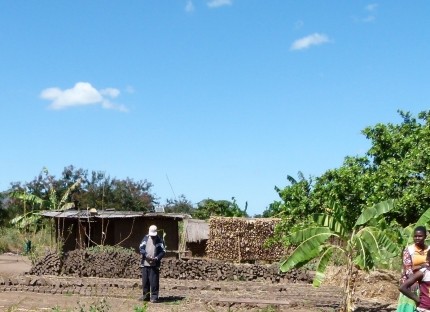
Brick making is a significant source of income for the people in Southern Tanzania as the soil is strong.
The process of making bricks involves creating a pit of mud, packing the wet soil into forms to make rectangular shapes and then baking them over a fire.
However, the challenging thing about this task is that is requires a lot of water, which is difficult for most villages to collect.
Chilaile is no exception.
Water is scarce and almost non-existent in the dry season.
But now that GAiN has provided a deep-capped water well, the village has been transformed.
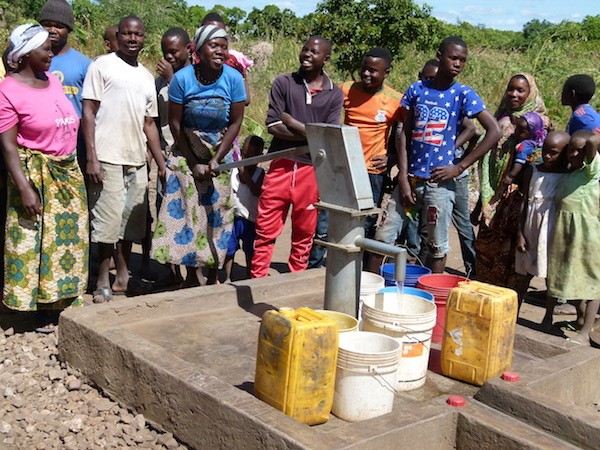
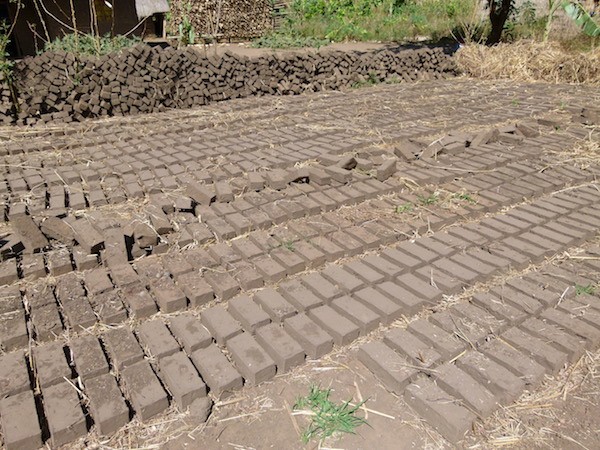
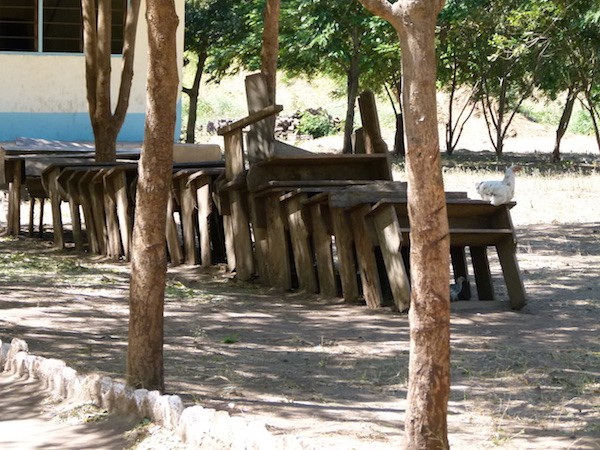
Not only has the well improved the local economy, it has made significant impact on the health of the village.
Villagers used to suffer from a lot of waterborne diseases such as dysentery and cholera. Today, they are drinking clean and safe water.
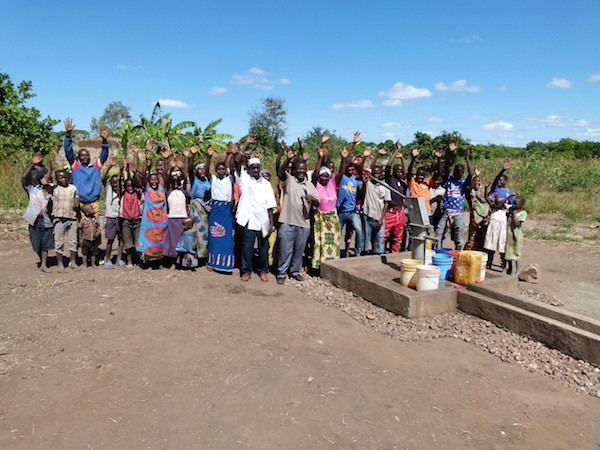
WILL YOU HELP OTHER VILLAGES RECEIVE THE GIFT OF CLEAN AND SAFE WATER?
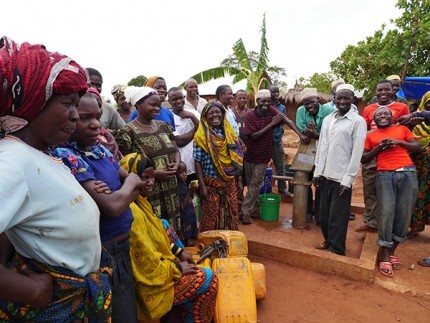
To see the health a village, just look at the health of its children.
In African society, the lack of clean water places a large burden on women because they are often tasked with the responsibility of collecting water for the family.
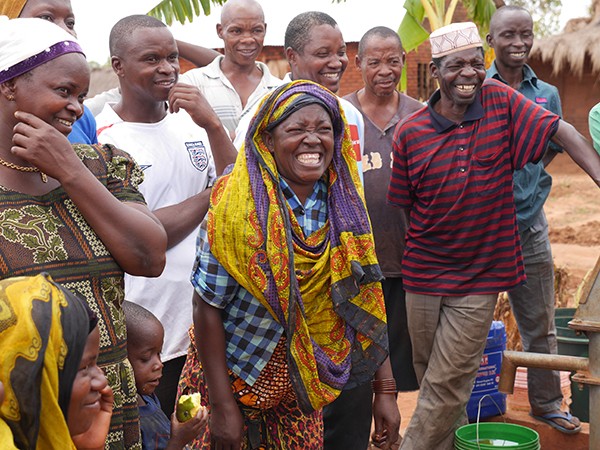
So we were delighted when we visited the village of Kariakoo, Tanzania and asked how the addition of a deep-capped well has impacted the village. A woman in the crowd answered, “Now we have more time to make babies!”
This answer was met with a roar of laughter but as funny as the statement is, it is true. Her statement is a reflection of the impact that clean water can have, not just on one woman but on a family and a whole community.
This lady wanted more children, but because of the hardships surrounding a lack of clean water, she didn’t have the capacity, time or health to bear and care for another child. Now with the deep-capped well in place, she has improved health and more time to devote to nurturing her family.
WANT TO MAKE A DIFFERENCE IN THE LIVES OF FAMILIES? THIS WORLD WATER DAY, MAKE A DONATION TOWARD A WATER WELL TO IMPROVE THE LIVES AND HEALTH OF FAMILIES!
GIVE NOW
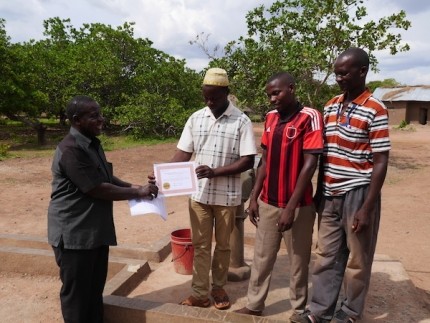
In Africa, nothing commemorates an important event like a ceremony. And after the implementation of a water well, a celebration is very much in order.
We designed a ceremony with plans to celebrate new beginnings in each village where we complete a well. To officially hand the well over to the community, we involve village leaders, the borehole committee and district government water authorities. The entire community is invited to celebrate and witness the commitment that village leaders are making to manage and maintain the water point.
This gives the community an opportunity to know who is on the borehole committee so they can keep them accountable and encourage them to take their roles seriously. It also recognizes the Ministry of Water and has them officially record the water point.
We had our first opening ceremony in the village of Namatumbus, southern Tanzania, where villagers gathered around excitedly at the site of the new well. Village leaders signed a code of ethics, committing to serve the village and maintain the well.
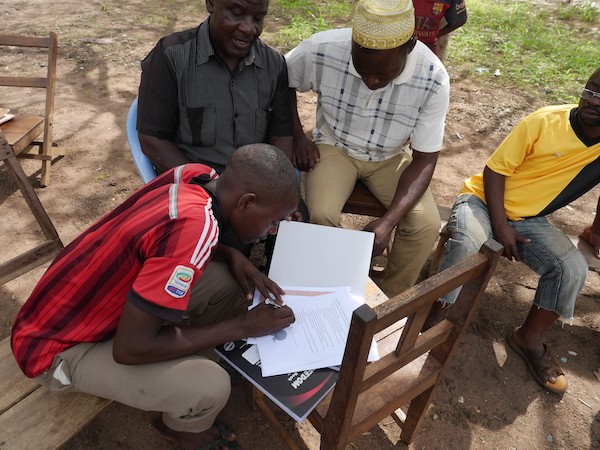
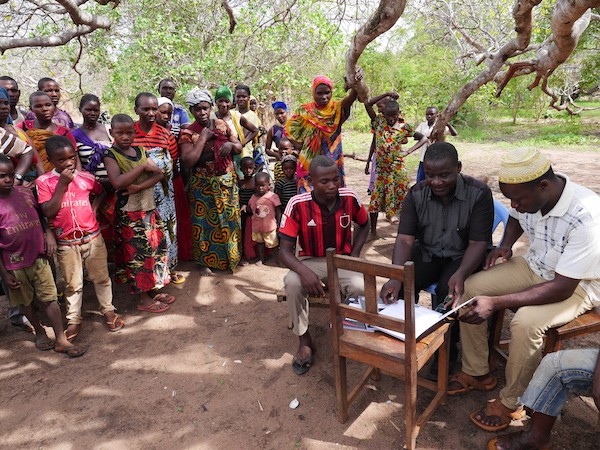
The community got to learn about how the well will be managed and learned about proper water use practices. After, they were given the opportunity to ask questions to their leaders, the district water engineer and GAiN staff.
The ceremony closed with the borehole committee being presented with a certificate and set of log books to help them manage the water point.
We are committed to long-term sustainability and know that community involvement is a key factor. These ceremonies are just one way to foster community ownership and build accountability within the community to care for the well.
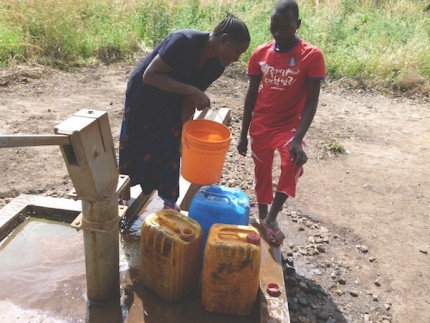
As our team travels from village to village, a common theme we hear is that we are making history. The village leaders say that the problem of disease and lack of clean water are now history in their villages. It is a problem of the past that the villagers are glad to leave behind.
With the deep-capped water well providing easy access to safe water, these villages have a new hope for the future. It is nearly impossible for a community to move forward and develop without water. They are stuck in the cycle of poverty and disease, unable to free themselves. Clean water changes everything. A new story begins in these three villages, one of hope and life.
Kimawe
The farming village of Kimawe in Southern Tanzania is an example of a village changed by safe water.
Surrounded by hills and entering its dry season, the country was in great need of water.
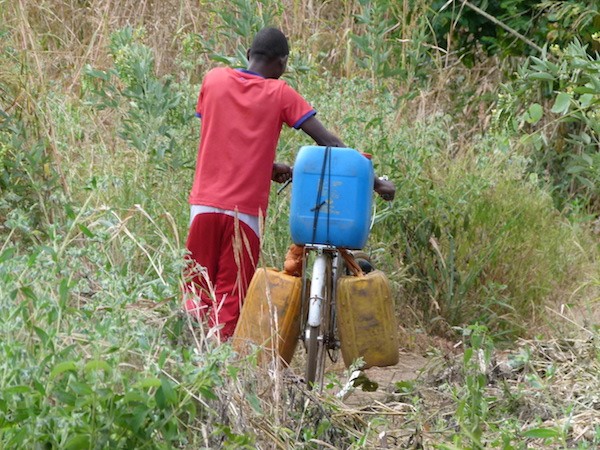
The villagers were travelling upwards of three hours, across the farmland and over hills to find a single bucket of water that isn’t even clean.
In a desperate attempt, the village gathered the young people and tried to dig to find water. They tried many times but did not succeed.
When we came to Kimawe and provided a well in the center of their village, it gave them much more than just clean water; it gave them more time to spend with their families to farm and get an education.
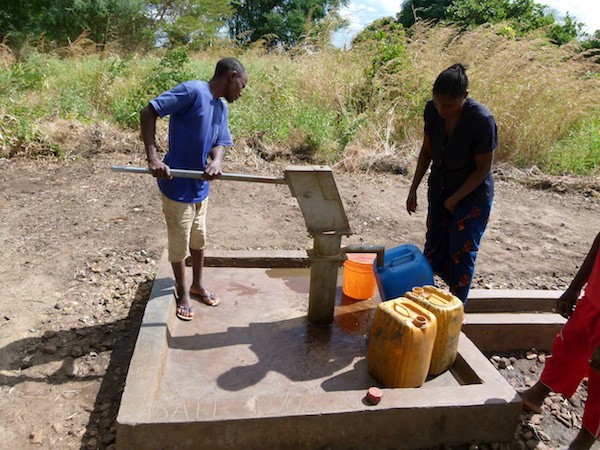
The families of this village benefited greatly from the well because the women are now able to stay home, care for their families and provide meals for their children so they can go to school.
They were amazed that the people in Canada would think of them in Southern Tanzania and were so grateful for this gift.
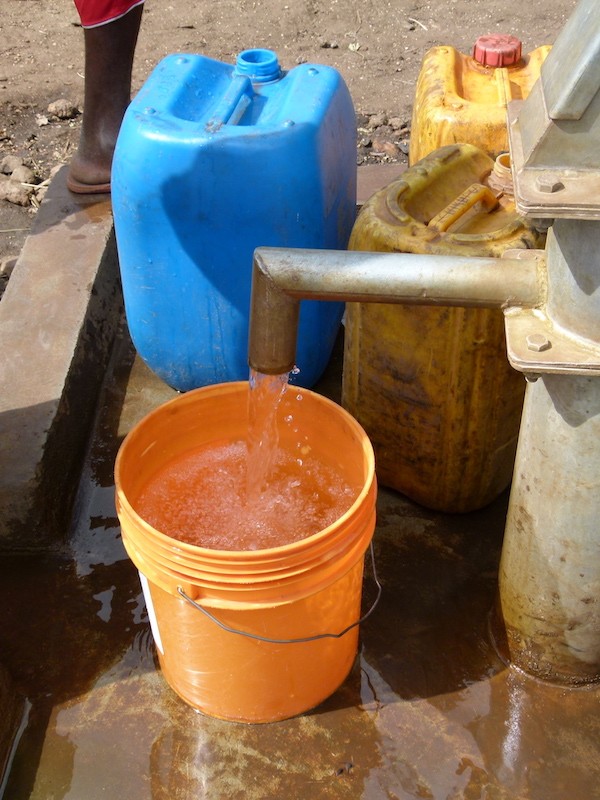
Another way clean water changes lives is by providing the opportunity to introduce villagers to Jesus. When we were in the village of Marambo B, we asked the people standing around the well if they had seen the JESUS Film, shown in partnership with the JESUS Film Church Planting Strategy (JFCPS). We received an enthusiastic response. “Yes, we saw it. It was wonderful, we liked it very much!”
A couple who became followers of Jesus at the film showing came forward and the husband said, “This was a very exciting film and it is something we take to remember in our hearts.”
The wife said that when they saw the film, they decided to become followers of Jesus and now their whole family attends the born again church. They were drawn to Jesus because they loved His words and promises. Before watching the film, they had no idea that God loved them and would help them.
Nandili
Water is also a scarce commodity in the village of Nandili.
Before we provided a well in this village, the people had to travel 18 km to find clean water. Women would spend most of their day travelling to collect water on the back of bicycles.
Now that women are able to stay home and care for their families, the children are able to have a meal and go to school with clean uniforms. They spend less time fetching water and more time studying. The well is next to the primary school where the children can fill their jugs as they walk to class.
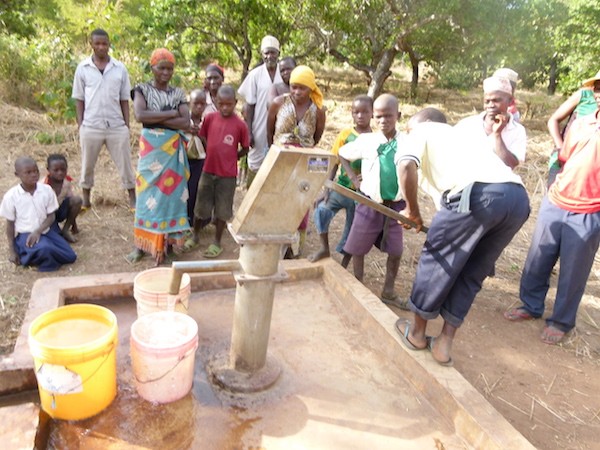
The village also has plans to use the water to make bricks for new school buildings. Most of the classes meet outside, which means they cannot study during the rainy season.
Brick making is a significant source of income in Southern Tanzania because the soil is strong. The process of making bricks involves creating a pit of mud, packing the wet soil into forms to make rectangular shapes and then baking them over a fire. The challenging thing about this task is that it requires a lot of water which is difficult for most villages to collect.
Chilaile
Chilaile in Southern Tanzania is no exception. Water was scarce and almost non-existent in the dry season, but now that we provided a borehole well, this village has been transformed too.
The water point is surrounded by bricks laying out to dry.
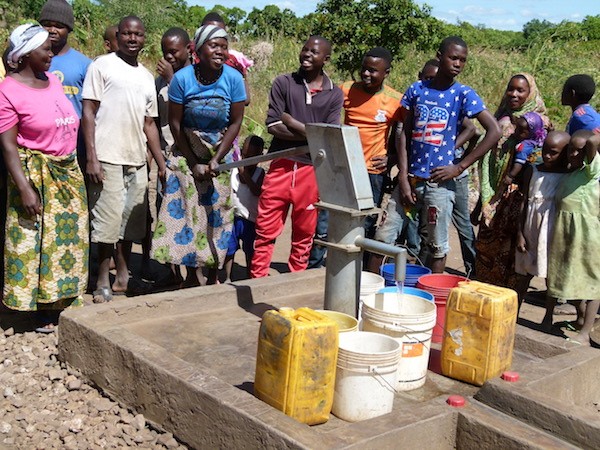
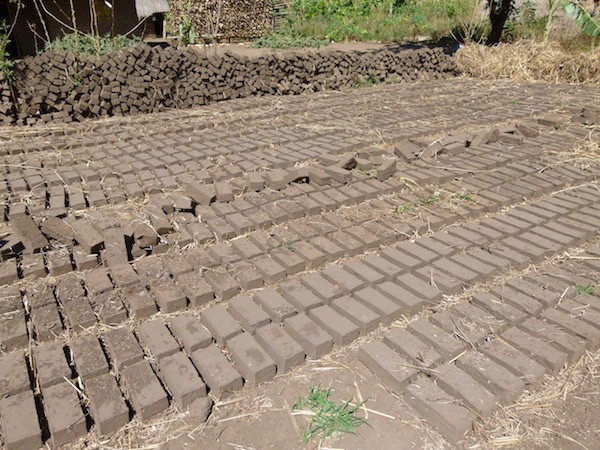
The village is planning on using them to build a new school building. Not only has the well improved the local economy, it has also had a huge impact the health of the village. They used to suffer from a lot of waterborne diseases such as dysentery and cholera, but now that they are drinking safe water, this has greatly decreased.
Kimawe, Nandili and Chilaile are just three examples of how safe water transformed their communities.
But just as these three have received this gift, there are three more still in need of it.
WOULD YOU HELP TRANSFORM ANOTHER VILLAGE? ANOTHER PERSON’S LIFE?
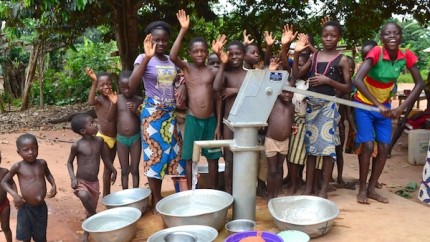
While done with good intentions, there have been water systems set up for developing countries that fail to sustain themselves – sometimes breaking down just a few years later, according to a 2004 report from Rural Water Supply Network – leaving villagers without clean water once again.
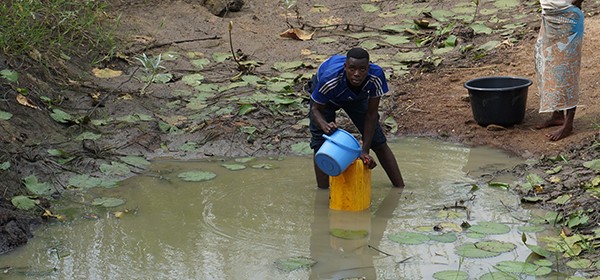
As a result, GAiN’s Water for Life Initiative (WFLI) Sustainability Project was put in place to ensure that the benefits of the wells and training programs would be long lasting – providing villages with the proper tools and knowledge to fix and maintain the water wells, as well as carry on best sanitation and hygiene practices. The goal is to create a system that does not just serve the community for the moment, but one that will continue to be beneficial to future generations.
“We recognized a need to focus on long-term sustainability a couple of years ago,” explains Tess Mawson – Project Manager, Sustainability for GAiN’s Water for Life Initiative. “As our program continued to grow, it was evident that we needed to provide not only quality services but enable villages to have continual services over longer periods of time.”
The first step was an in-depth review of current and previous WFLI projects – looking for insight into their successes, as well as areas that need improvement. Surveys were implemented, which Mawson felt would point the team in the direction of areas they need to focus on.
“I think sometimes with aid we could come in and say, ‘This will solve your problems,’ but really that’s not what they needed or what they wanted. We really wanted to provide solutions that are based on what the local people need,” says Mawson.
The planning and creation of two surveys started with an initial survey process in Tanzania in July 2016.
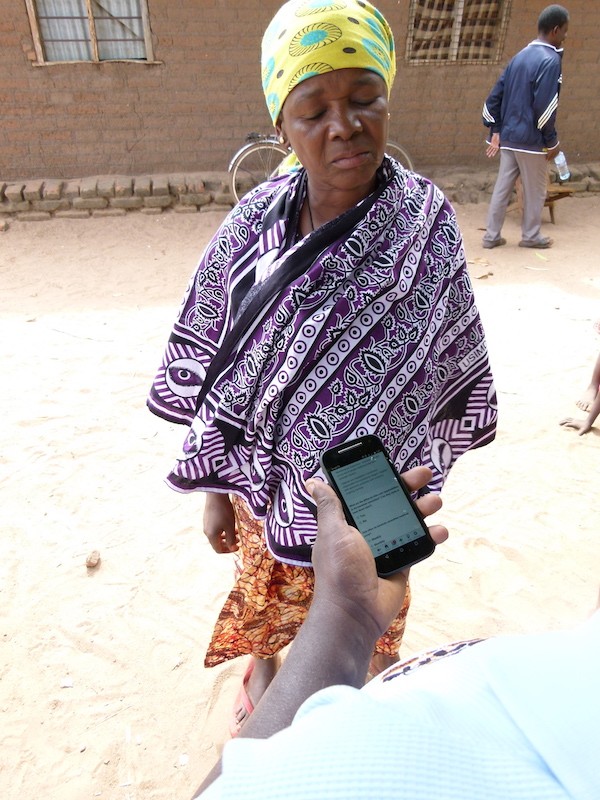
One of the surveys went to households, with questions on the use of water in their everyday lives (how they get their water, their handwashing practices, if they currently pay for water etc.). The other survey was for borehole committees, asking questions related to the wells (financial stability of the water management program and specifics on the functionality of the well and any breakdowns that may have occurred).
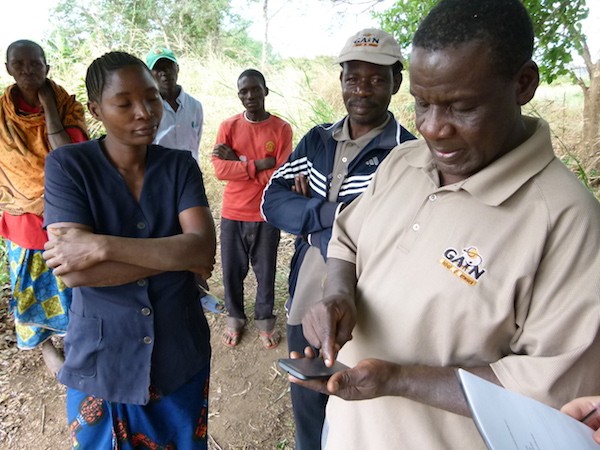
Borehole committees and regional repair representatives are a significant part of sustainability, as they are made up of locals responsible for caring for, maintaining and repairing the deep-capped water wells. They also manage and collect fees charged per bucket of water that goes towards maintenance.
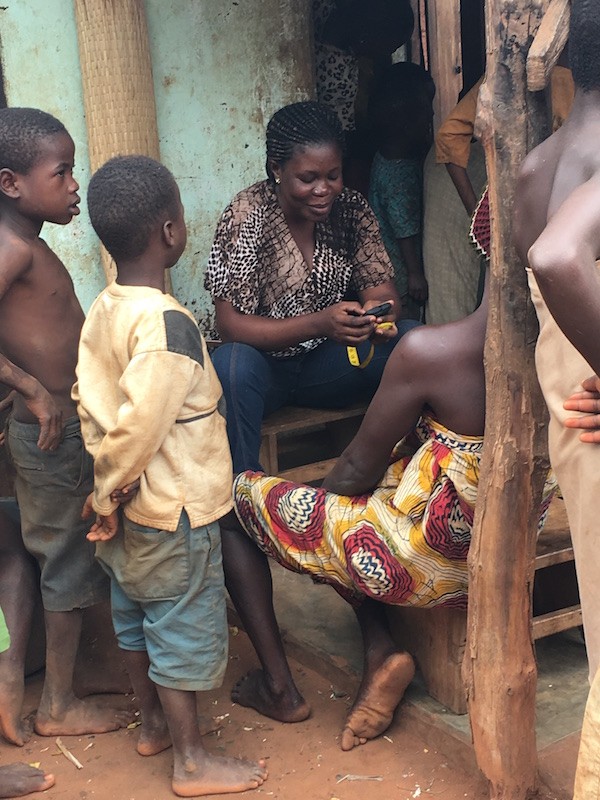
In the coming year, GAiN intends to refine the borehole committee training manuals with a focus on budgeting and saving, ensuring wise financial decisions are made that will preserve the well and further the development of the community.
Regional repair representative programs have been revisited as well. Further equipping reps with the tools and knowledge to become the main contact person for the community is a key focus area. The plan is to invest in locals so that the community will be able to support themselves.
“We want to build up local repair representatives with business and technical skills and provide them with clients by connecting them to the villages with our wells, to help them successfully run their own businesses,” says Mawson. “We also want to connect local supply companies to repair reps so that they can get the resources they need to do repairs. This is a more sustainable model because it improves the local economy and provides jobs and allows for independence and continual support.”
Another focus area of the Sustainability Project is hygiene and sanitation training.
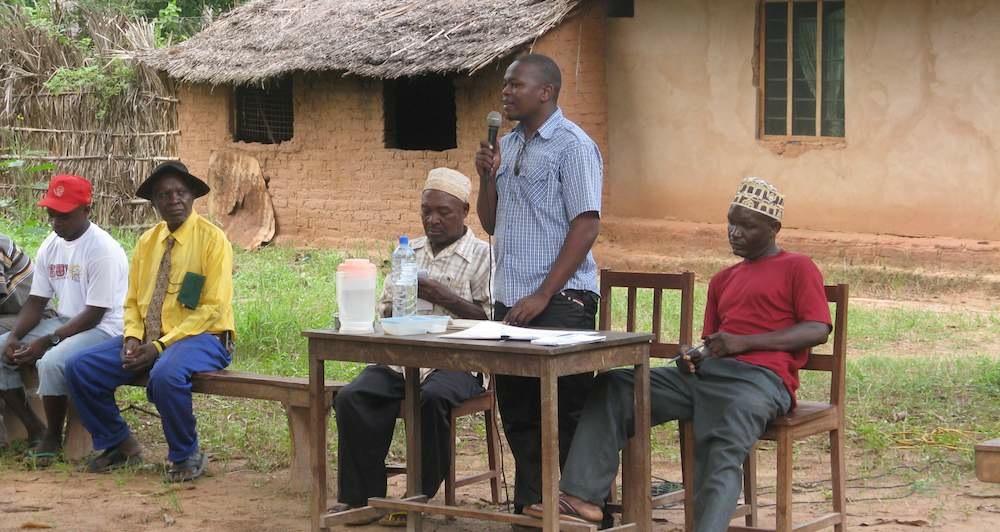
With the current training program in place, the goal of the Sustainability Project is to emphasize to locals the impact that proper hygiene habits and behaviours can have on their health in the future.
Emphasis on the future is important, because African people tend to live in the moment and so future planning is often not a priority.
“They need to get through today, they need to survive, they need to feed their families and things like that,” explains Mawson. “They have a very moment-by-moment mentality, so sustainability is a hard thing for them to grasp but many recognize the importance of it and are willing to work toward that desired future.”
Phase 1 of the project is now done and the team is pulling together the results, which will be communicated in the next few months.
Water is a scarce commodity in the village of Nandili in Southern Tanzania.
Before we provided a deep-capped water well in this village, the people had no option but to travel 18km to find clean and safe water.
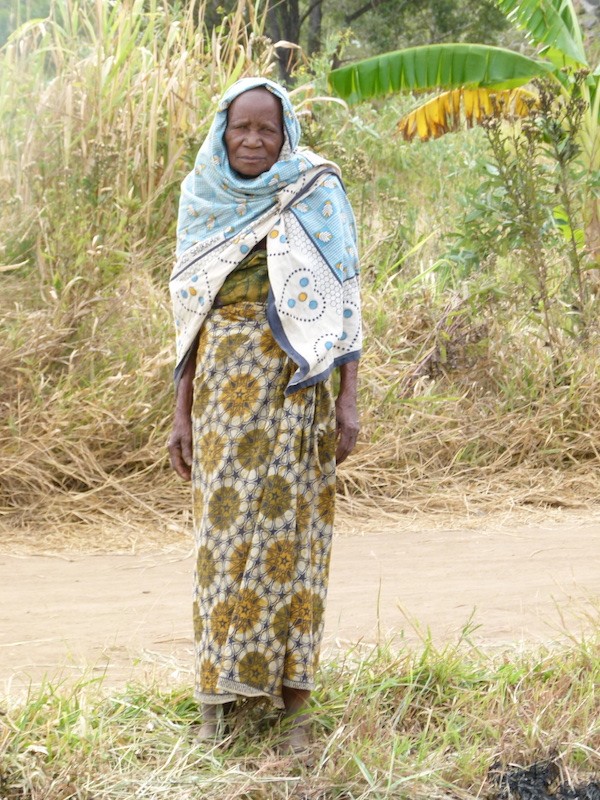
Women used to spend most of their day travelling to collect parasite-ridden water on the back of bicycles.
Fortunately, that has all changed.
Women are now able to stay home and care for their families.
Children are able to have a meal and go to school with clean uniforms. They spend less time fetching water and more time studying.
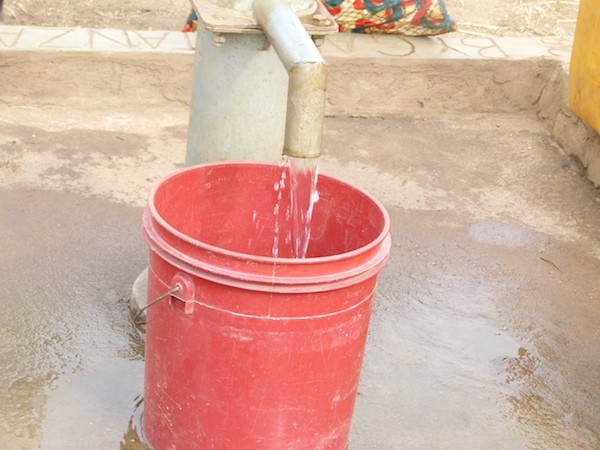
The well is located next to the primary school where the children can fill there jugs as they walk to class.
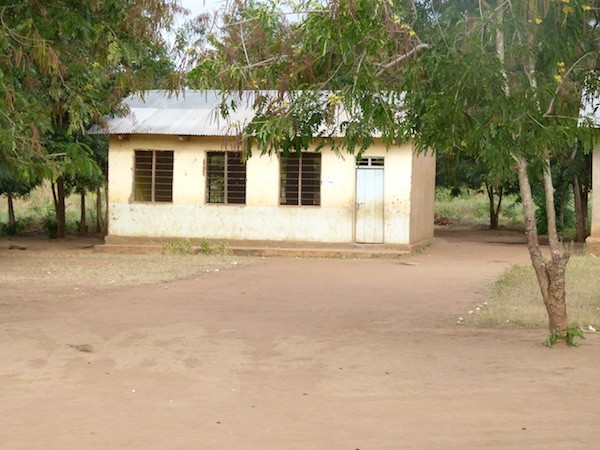
Most of the classes meet outside, which means they can’t study during the rainy season.
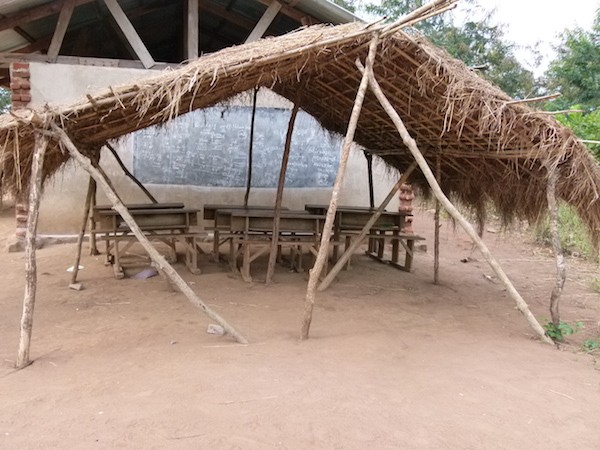
As a result, the village has plans to use the water from the new well to make bricks for new school buildings.
Nandaili’s well brought transformation to the villagers.
Both daily water use and education were radically impacted. Both worked hand-in-hand in providing freedom, safety and hope.
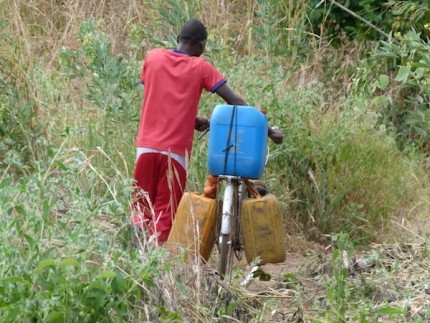
The farming village of Kimawe in Southern Tanzania is surrounded by hills.
As the country enters its dry season, there is an especially great need for clean and safe water in this area.
Villagers travel up to three hours to find water, crossing farmland and over hills for a single bucket of water that wasn’t even clean.
In a desperate attempt to get water, the village gathered the young people and tried to dig to find water. They tried many times but did not succeed.
When GAiN’s Water for Life Initiative came to Kimawe and provided a deep-capped water well in the center of their village, it gave them much more than just clean water.
It gave them more time to spend with their families, to farm and to get an education.
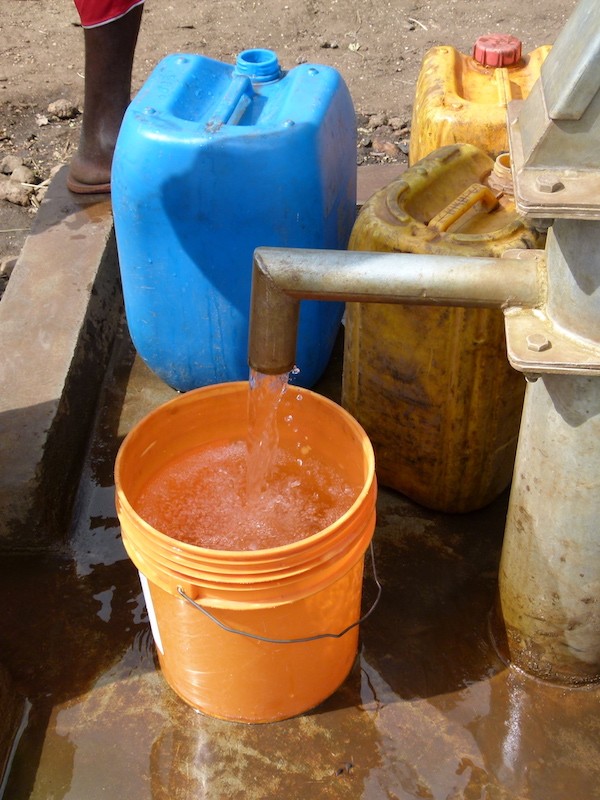
The families of this village benefited greatly from the well because the women were now able to stay home and care for their families and provide meals for their children.
They were grateful for the gift of clean water and AMAZED that the people in Canada would think of them in Southern Tanzania.
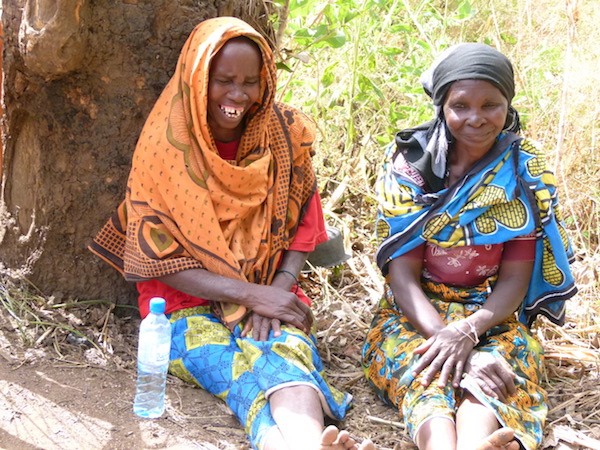
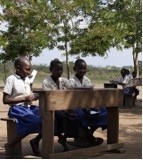
The village of Namauni, located in Tanzania, was able to build a teachers house at the school with the coming of the deep-capped water well.
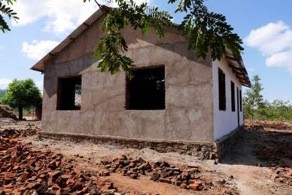

The school and teacher’s buildings were constructed with small clay bricks, but there were no water sources anywhere near the school, which made construction difficult and costly.
With the well nearby, the construction of the buildings was made much easier. In fact, the well brought down the going cost of bricks from 50 Tanzanian Schillings apiece to 30 Tanzanian Schillings apiece, all because water was readily accessible to make the bricks. The village also expects a housing boom in the near future, in large part because there is a nearby source of clean, disease-free drinking water. Having a nearby source of water will also increase the productivity of needed bricks.
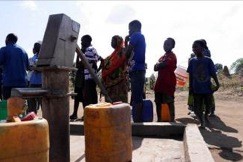
Perhaps the greatest impact is in the lives of the children; particularly the girls. Instead of using valuable time to collect water, they can now spend that time at school getting an education as well as in other village activities.
